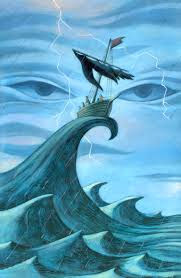Temperance in Moby Dick
- The Tempest
- Apr 9, 2016
- 3 min read

After reading the first three-quarters of the novel, it had been illustrated that the goal of the Pequod--and subsequently its crew--was, in Ahab's words, "to chase that white whale on both sides of the land, and over all sides of the earth, till he spouts black blood and rolls fin out" (Melville 177). This goal is certainly carried out in the subsequent chapters, as we learn of whales being ambushed, harpooned, cut to shreds, and poisoned to be seized. Subsequently, it is rare in the proceeding exposition to learn that the crew is really doing anything remotely resourceful with the kill. Many of them are left in the water saturating it with blood, while other whales are hoisted aboard to extract oil from. However, the process of extracting oil, which would be an integral part of a whaling ship operation, are not discussed in much detail by the usually thorough and superfluous Ishmael. It seems odd that our narrator would spend several chapters discussing in detail the history and taxonomy of whales, along with illustrations and artistic interpretations of them, and not devote any time to the collection and processing of the oil, which was the principle reason that a whaling ship captured whales. As for other whales, we learn that they are superfluously hung from the port and starboard sides of the boat as trophies. It is clear that Melville's intent was to raise the greater metaphorical question of the morality of and rationale for hunting whales (and for the larger morality and rationale of slavery) as we see the heartless and pointless torture and death of innocent life through a morally-faulty (to say the least) capitalistic enterprise. Many leftist scholars have elaborated with subjective and loathing discourse on the aforementioned subject, but to argue that Melville's intent was to indict the capitalistic enterprise of whaling here just seems too dim-witted, boring, and elementary to this scholar.
The larger argument presented here could be the effectiveness and legitimacy of moderation, or temperance. Although, the temperance movement began as a social backlash to the consumption of alcohol, the movement slowly began to incorporate other elements of the culture as well, including commercial enterprise. The novel provides many examples of the balance of necessity for enterprise as well as its intentional moderation. This is initially illustrated in Ahab's conversation with Starbuck quoted earlier. Starbuck, upon learning of Ahab's greedy intent, argues that he is only interested in "the business we follow" (Melville 177) as "he came here to hunt whales, not my commander's vengeance" (Melville 177). This example illustrates Starbuck's moderation in contradiction to Ahab's avarice, and strongly advocates for the moral sensibility of temperance. Furthermore, Ishmael's appreciation of and respect for the whale is also illustrated in chapter eighty-five as he explains, as he considers the nature of the sperm whale, that he has "doubts of all things earthly, and intuitions of some things heavenly; this combination makes me neither believer nor infidel, but makes a man who regards them both with an equal eye" (Melville 409). This example of a capitalistic temperance distinctly demonstrates that Ishmael has established an appreciation of and a gratefulness for the opportunity of whaling, but understands the necessity for the responsible moderation (and today thankfully the cessation) of the whaling industry.
Melville, Herman. Moby Dick. 1851. London: Penguin. 2003.






Comments